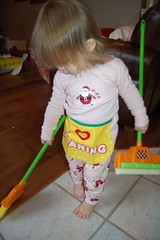Maybe you're one of the lucky ones, but for us, chores have always been . . . difficult. Between finding a system that works for our family to finding the motivation to actually
do it, sometimes having my kids do chores is harder than just cleaning the house myself!
But really, I'm not here to take care of everything for them:
as a mom, one of my jobs is to teach my children how to become independent adults one day. And as part of that, I've learned that I need to teach them to do their chores.
 |
| Photo by Virginie Moerenhout |
Let me say that again, because that's the #1 principle that every parent should know:
1. Children must be taught to do chores.
Nobody is born knowing how to pick up a room, put laundry in the proper drawers, do the dishes, etc. We must learn. It helps if we start teaching them while they're young. I imagine that many adults learned to do chores at such a young age that they hardly remember the learning period, but kids don't have that luxury.
2. Children (like everyone else!) need clear expectations for chores.
Most children under the age of about eight can't just be set in a messy room and commanded to clean it. They need specific instructions on what to pick up (i.e., categories of things: toys, books, clothes), where those categories of things should go (i.e., toy box, bookshelf, hamper), and what constitutes being "done." I remember myself being "done" with cleaning only to discover that my parents expected a lot more--and I see the same thing from my kids. It's frustrating for everyone.
3. Recognize the difference between "picking up" and "cleaning."
There's a big difference between picking up things and actually cleaning the house. If you only have small children, they will probably
not be
cleaning: vacuuming, scrubbing toilets, mopping floors. They should, however, begin
picking up very young: putting away toys, books, clothes and other things on the floor.
Picking up usually makes a bigger difference faster.
Cleaning is a more advanced skill that, again, must be taught.
4. Systems. Work.
While not every system will work for every family or every child, the basic principle holds true: a chore system works. It helps to make the expectations and responsibilities clear, and the best systems also help track progress and completion--and even reward them! We've been using
Family DoDots since January and for the most part, it's been very effective at keeping our family on track through the birth of a new baby and a move, two things that can derail any system.
5. Accept some mess.
This might sound contradictory in an article on doing chores, but I do believe that it's okay to have some mess in your home. Everyone's comfort level is different, but it's important to remember that
they're kids. I also try to keep in mind that some days there's more mess than there are hands to pick it up, so I do triage: I pick the three messiest areas and assign them to my three chore-aged kids (plus a fourth area they work together on, and their bedrooms), and let the rest wait until another day. (Or, I guess, I pick it up myself if it's really bugging me.)
6. Work on your kids' level.
A teenager, unlike a preschooler, should usually be able to pick up and clean a room pretty independently. We start encouraging our kids to pick up around age one or so. By the time they're about two, we start our kids on actual chores--but we keep these age appropriate. Also, as we make assignments, we try to tailor them to each child. My seven-year-old's dresser drawers are labeled with words. My three- and five-year-olds' drawers are labeled with pictures.
7. Work with your kids.
This might actually be the #1 thing to do. It's certainly the #1 thing for me: nothing else helps to keep my children on task, happy and helping more than having me there with them, guiding, interacting and most of all modeling what to do. I do
not do their chores
for them, but when I work
with them, we all get through the process faster and happier.
What other ideas & attitudes help you with your kids' chores?
Coming up in the Kids' Chores series: more on ways to make your expectations clear, tailoring your chores to your kids' ages, and how to get them to DO them!






























































